David Smyth shares his experience of growing up in Northern Ireland during the Troubles, and considers the role of the Church in sustaining peace
Growing up during the Troubles, I remember my father taking turns on ‘car-park duty’ at church each week. This was to make sure no one stole our cars while we were worshipping – or so I thought. I only found out years later that the real reason was to deter anyone from attaching bombs to the vehicles of the police officers in the congregation. Alongside others, he was helping to create a literal safe space where, for a short time at least, policemen and women could worship without fear.
Today, if you look at a map of Northern Ireland overlaid with a religious breakdown of Protestants and Catholics, you will still see physical divisions. I grew up in Hillsborough, a few hundred yards from the only royal palace in Northern Ireland. Unsurprisingly, the village was 98 per cent Protestant. My friend grew up in South Armagh, a few hundred yards from the border. Her village was 98 per cent Catholic. This is why many young people still do not have any real friends from the ‘other’ community. Even in more mixed areas, people often go to different schools, read different newspapers and follow different sports teams.
In areas where the violent impact of the Troubles was greatest, we continue to see some of the highest levels of family breakdown, addiction, deprivation, poor mental health and adverse educational outcomes. Put simply: dealing with the legacy of our past is one of the greatest moral and social justice issues facing Northern Ireland today.
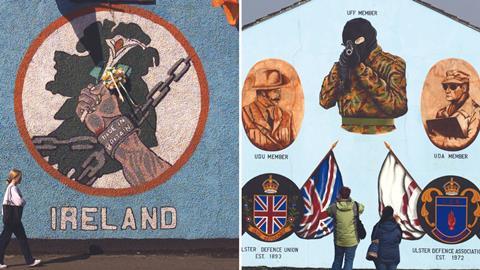
A place apart
Northern Ireland is a place apart. My British friends love our accents and our craic but are often bemused by the colour and bluster of the British Nationalism they see displayed on the other island. A bit like that uncle at the family wedding: we’re family, but estranged.
On the face of it, the protracted Protocol negotiations are about a technical and political trade agreement. Yet, for many in Northern Ireland, this is just the subtext. The real conversation is taking place in the deeper, emotional and historical realm of identity and loyalty.
Religion has been bound up with our history, geography and politics for so many years that it is a difficult thing to unravel. In the north of Ireland in the 1600s many native Irish Catholic people were displaced from their land, which was seized and given to loyal English Protestant gentry. All this happened in the middle of much wider political turmoil and the religious upheaval of the Reformation.
Thousands of ordinary English and Scottish Protestant families, including my own, were then sent to ‘settle’ the land. Scottish Presbyterian, Anglican and, later, Methodist clergy came to serve the new planted communities.
For a long time, law, language and custom ensured that native Irish Catholics were treated less favourably. Unsurprisingly, this did not go unchallenged and, for several hundred years, violent clashes continued to be a feature of the religious and political landscape. This was the case right up to (and beyond) 1921, when Ireland was divided into the Republic of Ireland and Northern Ireland, a new and smaller constituent part of the larger United Kingdom.
No law can force me to forgive or love my neighbour, let alone reconcile with my enemy. That’s the domain of the Holy Spirit
The Irish sought to regain what they had lost, and the British sought to defend what they had gained. For many people for many years, to be British was to be Protestant and Unionist and to be Irish was to be Catholic and Nationalist.
Different stories, different goals, different heroes and villains. Both are about people and land and both, at various times, invoked God, bloodshed and martyrdom on their side. If you want to understand Northern Ireland and the people, you need to appreciate the larger stories we tell ourselves. The stories in which many people find their identity, form their relationships and forge their purpose.
The Troubles
In the late 1960s, a new civil rights movement began in Northern Ireland, inspired by the advocacy of Martin Luther King Jr. There was significant discrimination against Catholics, with regard to employment and housing in particular, and a small grassroots Catholic and Protestant movement began to mobilise and march for fairer laws. It was against this backdrop that the Troubles, as we colloquially call them, began in 1969.
The conflict saw the rise of new paramilitary groups with more deadly weapons. Over almost 30 years, we witnessed 3,720 deaths. Around 58 per cent were carried out by Republican paramilitaries, 30 per cent by Loyalist paramilitaries and approximately ten per cent by police or security forces. While it’s possible to count bodies, bullets and bombs, the traumatic legacy for individuals and generations to come remains more difficult to quantify.
It was an incredibly dark and difficult time for many people, including the Church. Many considered their religious identity an essential part of what was at stake in the fighting. For others, the conflict had nothing to do with real, living faith in Jesus; it was more about land, tradition, power and politics.
In some parts, the Church was complicit, aiding and abetting political posturing from the pulpit in ways that fuelled state nationalism and failed to further the kingdom of Christ. Elsewhere, the Church was bold and prophetic, naming injustices and calling people to repentance. At times the Church was deeply pastoral, burying the dead, comforting the bereaved, counselling and practically caring for those affected. It was often clergy who helped to facilitate discreet spaces to bring political foes together to begin new conversations about peace and reconciliation. But often the Church was just faithfully present through the laity – teachers and nurses, business owners and politicians; people living out their everyday witness between horror and hope.
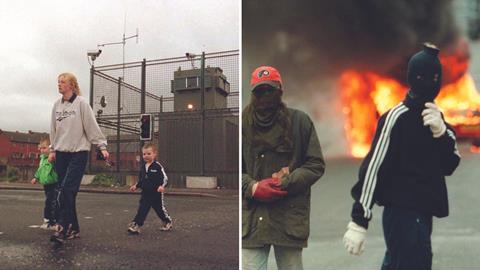
The peace
Given that which went before, the Good Friday Agreement (GFA) is all the more remarkable. It conceived the Northern Ireland Assembly, designed to provide devolved government and proportional representation, with built-in safeguards for minority groups. New Equality and Human Rights Commissions helped to ensure fairness in public and civic life, housing and employment.
Bodies created to further North-South and East-West relations helped to build relationships across and beyond the jurisdiction. Protected status was given to both cultures, language and traditions. Lots of money from the European Union and America helped stimulate foreign-direct investment and bring together pupils from across divided communities.
Religion has been bound up with our history, geography and politics for so many years that it is a difficult thing to unravel
The text of the GFA was put to a referendum in May 1998, and 71 per cent of people voted “yes”. Interestingly, while a majority of both Catholics and Protestants supported the agreement, the figure was 96 per cent of the Catholic population, compared to 55 per cent of the Protestant population. For a significant minority, important and understandable doubts remained. While the Democratic Unionist Party (DUP) did not originally support the Agreement, they later co-ruled the Northern Ireland Executive alongside Sinn Féin (after the IRA agreed to decommissioning) broadly under the terms as amended by the St Andrews Agreement in 2006.
Some of the more difficult aspects of the Good Friday Agreement included the decommissioning of weapons, the renouncement of political violence and the release of prisoners who had been convicted of Troubles-related crimes. This was a particularly difficult pill for the families of victims to swallow and means that, even today, if someone is convicted of a “scheduled offence”, such as murder, committed during the Troubles, their jail time is limited to two years.
A new covenant
Trust, genuine relationships and a shared desire to govern for the common good is still in low supply in some quarters. Support is growing to reform the institutions created by the GFA, or even fundamentally renegotiate the Agreement itself.
For example, the Good Friday Agreement provided for mandatory power-sharing between the biggest Unionist and Nationalist parties. This was perhaps essential to help political foes begin to govern together and to protect the minority community. However, it also means that when either party refuses to enter government, no government can be formed – even if other parties are willing to do so.
Today, Northern Ireland hasn’t had a devolved government for more than a year, since the DUP withdrew support because of the perceived threat to the constitutional status from the Northern Ireland Protocol (drawn up to avoid a hard border between Northern Ireland and the Republic of Ireland in the wake of the UK’s withdrawal from the European Union). How exactly this issue will be resolved remains to be seen.
Just six weeks ago, DCI John Caldwell was shot multiple times, allegedly by the New IRA. The off-duty police officer was gathering up balls after coaching a children’s football practice. The attack happened in Omagh, a small town where, in 1998 – just four months after the signing of the Agreement – a dissident republican bomb killed 29 people.
Thankfully, these outbreaks of violence are now relatively rare, but they remain a stark reminder of both the journey and responsibilities that lie ahead.
The signing of the Good Friday Agreement was a seminal moment in the short history of Northern Ireland. But it is not a silver bullet, nor the beginning or the end of the story. Legal and political agreements are important, but they can only ever get us so far.
Peacemaking must become a core part of the everyday discipleship and witness of the Church in this place. No law can force me to forgive or to love my neighbour, let alone reconcile with my enemy. That’s the domain of the Holy Spirit. So, this Good Friday, join me in praying for the justice and forgiveness we see displayed on the cross, and the power and new life we see in the resurrection to come afresh in Northern Ireland.













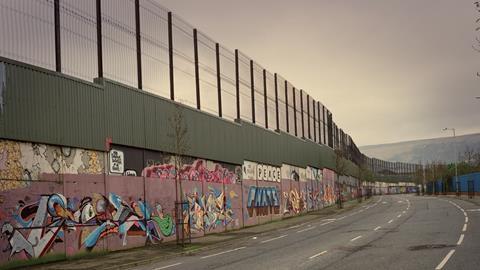

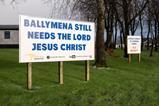
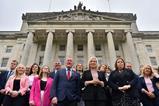





















No comments yet